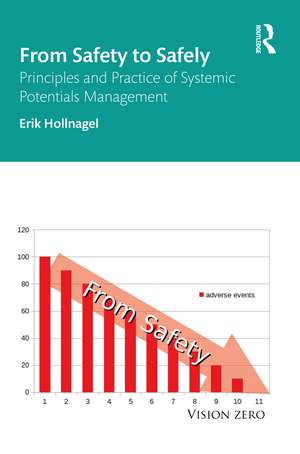From Safety to Safely: Principles and Practice of Systemic Potentials Management
Autor Erik Hollnagelen Limba Engleză Paperback – 31 dec 2024
Now often referred to as Safety-II, this solution is the logical consequence of resilience engineering and will require new methods, several of which already exist and have proved their worth in practice for years. The question ceases being what to manage and becomes how to manage. Managing safety is protective, hence a non-productive cost, which at best avoids a loss. Conversely, managing safely is productive and can generate revenue in addition to preventing or avoiding losses; aviation and mining are prime examples.
From Safety to Safely provides a practical perspective on managing safely, illustrating a practical form of synesis. It offers a new understanding of safety, combining concerns for productivity and safety rather than juxtaposing them, and shows how to manage complex industrial and social systems in the spirit of resilience engineering and synesis. It is the first book to completely dispense with the loaded term "safety" while offering a practical and viable alternative. Spoiler alert: This book does not mention or analyse any celebrated accidents.
This book is for all middle and senior managers, board members, and independent consultants seeking to ensure safe, revenue-generating operations.
Preț: 212.13 lei
Preț vechi: 279.23 lei
-24% Nou
Puncte Express: 318
Preț estimativ în valută:
40.59€ • 44.23$ • 34.20£
40.59€ • 44.23$ • 34.20£
Carte nepublicată încă
Doresc să fiu notificat când acest titlu va fi disponibil:
Se trimite...
Preluare comenzi: 021 569.72.76
Specificații
ISBN-13: 9781032664705
ISBN-10: 1032664703
Pagini: 176
Ilustrații: 60
Dimensiuni: 156 x 234 mm
Ediția:1
Editura: Taylor & Francis
Colecția Routledge
Locul publicării:Oxford, United Kingdom
ISBN-10: 1032664703
Pagini: 176
Ilustrații: 60
Dimensiuni: 156 x 234 mm
Ediția:1
Editura: Taylor & Francis
Colecția Routledge
Locul publicării:Oxford, United Kingdom
Public țintă
Adult education, Postgraduate, Professional Practice & Development, and Professional TrainingRecenzii
"Even deeply-read safety scholars will profitably immerse themselves in this latest book from Professor Hollnagel. Not just scholarly readers, too. Everyone – researchers, business people, safety practitioners for example – will learn from engaging in this splendid book."
Professor Jeffrey Braithwaite, Professor and Director, Australian Institute of Health Innovation, Macquarie University, Australia
"After acronyms and atavism, Erik is now resorting to a clever grammatical twist to inspire the reformation instead. He’s deploying just one letter substitution. And taking us from noun to adverb. From safety to safely. The shift this heralds, however, is not subtle at all. In fact, it’s huge. We’ve been managing safety for its absence. Which, if you think about it (which Erik has done a lot), is not only illogical but profoundly stupid. “Managing the primary process of a system or a company well is after all what provides the basis for productivity and business, regardless of domain and type of activity,” Erik writes. Managing it safely means doing just that, and assuring that you can keep doing it – as long as you learn from what goes well, and why, and then commit to doing ever more of it. Who can disagree with that?"
Professor Sidney Dekker, Griffith University, Australia
"This new book is a profound exploration of the prevailing interpretation of safety, taking us on a captivating journey through the foundations and assumptions underpinning our approach. It's a groundbreaking work which prompts us to reconsider the very essence of safety management."
Professor Dr. Andrew Sharman, Managing Director, RMS Switzerland, Switzerland
Professor Jeffrey Braithwaite, Professor and Director, Australian Institute of Health Innovation, Macquarie University, Australia
"After acronyms and atavism, Erik is now resorting to a clever grammatical twist to inspire the reformation instead. He’s deploying just one letter substitution. And taking us from noun to adverb. From safety to safely. The shift this heralds, however, is not subtle at all. In fact, it’s huge. We’ve been managing safety for its absence. Which, if you think about it (which Erik has done a lot), is not only illogical but profoundly stupid. “Managing the primary process of a system or a company well is after all what provides the basis for productivity and business, regardless of domain and type of activity,” Erik writes. Managing it safely means doing just that, and assuring that you can keep doing it – as long as you learn from what goes well, and why, and then commit to doing ever more of it. Who can disagree with that?"
Professor Sidney Dekker, Griffith University, Australia
"This new book is a profound exploration of the prevailing interpretation of safety, taking us on a captivating journey through the foundations and assumptions underpinning our approach. It's a groundbreaking work which prompts us to reconsider the very essence of safety management."
Professor Dr. Andrew Sharman, Managing Director, RMS Switzerland, Switzerland
Notă biografică
Erik Hollnagel is Scientific Director at the Institute of Resilient Systems+, Seoul, South Korea; Visiting Professorial Fellow, Faculty of Medicine and Health Sciences at Macquarie University, Australia; Visiting Fellow of the Institute for Advanced Study at the Technische Universitat München, Germany; and Professor Emeritus at universities in Sweden, France, and Denmark. His work focuses on unified system change and management. Erik is the author of more than 500 publications including articles from recognised journals, conference papers, and reports as well as 28 books, and he is still struggling to make sense of the blooming, buzzing confusion.
Cuprins
Foreword by Sidney Dekker, Foreword by Andrew Sharman, Part I: The safety legacy, Part II: The complexity conundrum, Part III: The futility of accident investigation, Part IV: Systemic potentials management, Part V: Coda: connecting the dots
Descriere
This book provides a practical perspective on managing safely, illustrating a practical form of synesis. It offers a new understanding of safety, combining concerns for productivity and safety rather than juxtaposing them, and shows how to manage complex industrial and social systems in the spirit of Resilience Engineering and Synesis.
